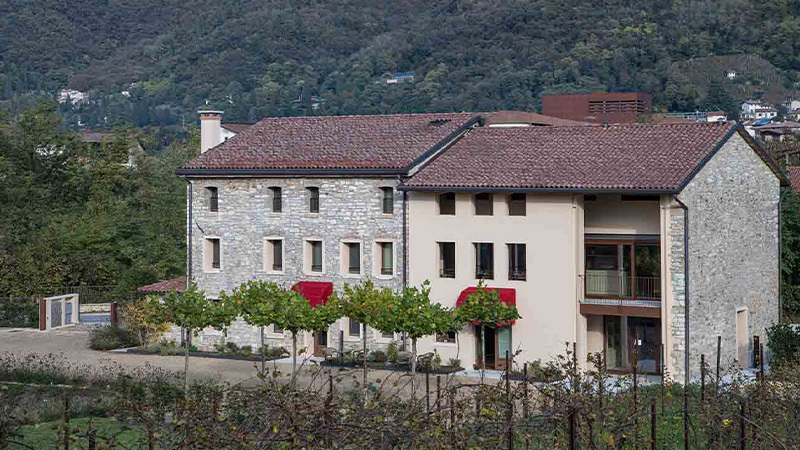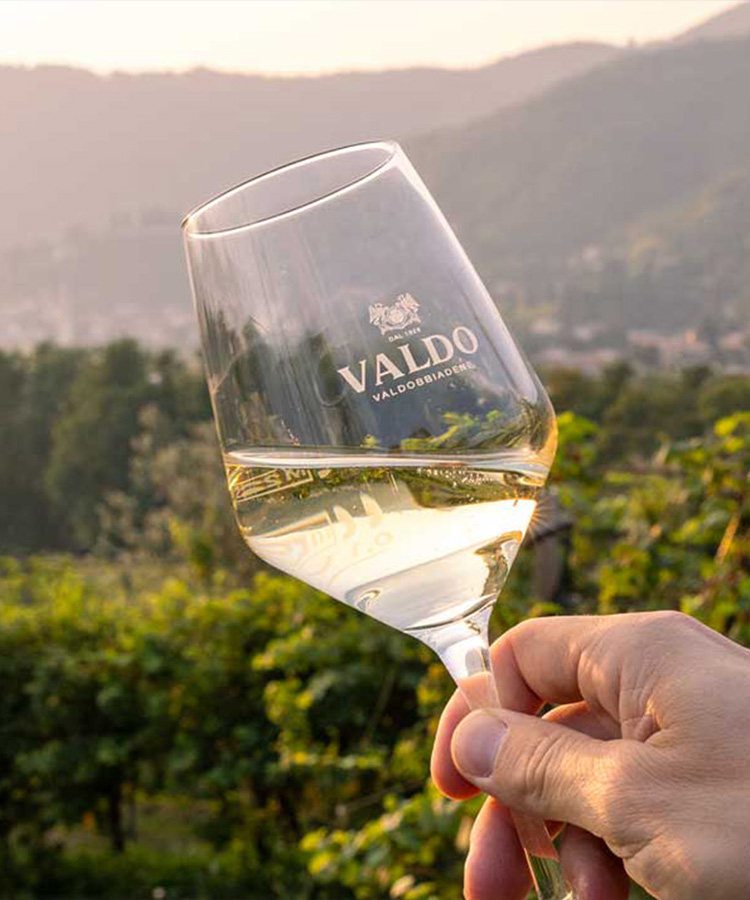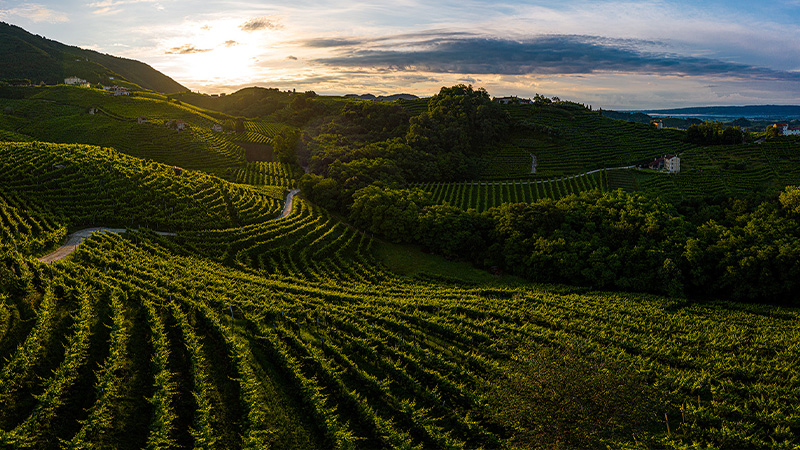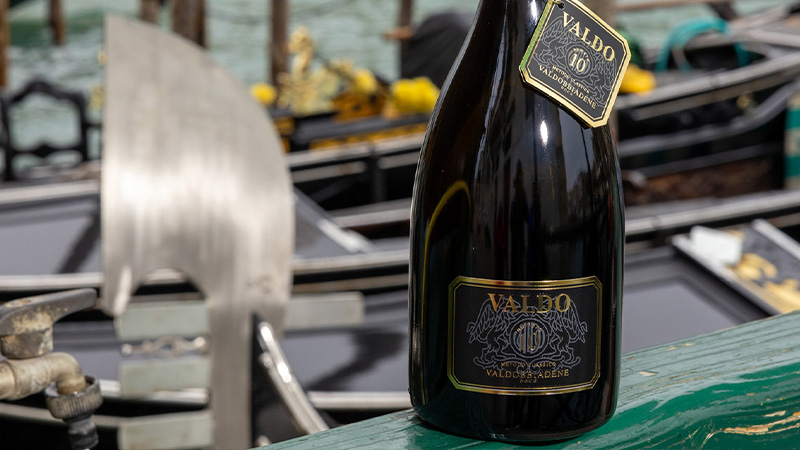
“We are the first sparkling house of Valdobbiadene, established in 1926,” says Matteo Bolla, third-generation family member for Valdo, based in the US. “We have almost 100 years of history and specialization in high-quality Prosecco.” Valdobbiadene, a town and commune in the northern province of Treviso, in Italy’s Veneto region, is a wine-growing area uniquely suited to the growth of the Glera grape — and to the production of the area’s finest Prosecco.
Valdo was founded in 1926 and purchased by the Bolla family in 1938. It remains family owned, now with three generations devoted to the family winery. Beloved by Italians, it is the best-selling Prosecco in Italy and Germany and also maintains an important stake in the British market. “The Italian customers that drink the good Prosecco — that know about the legitimacy, the authenticity, the history — choose Valdo,” Bolla says. The region’s D.O.C. requirements state that Prosecco must be aged for a minimum of 30 days following the charmat-Martinotti fermentation method prior to release. At Valdo, Bolla notes, sparkling wines are aged for a minimum of three months, and some wines are aged even longer, exceeding expectations for standard Prosecco imported to the United States.
Pierluigi Bolla, Valdo’s Chairman and CEO, oversees all operations and has been crucial in establishing Valdo as a leading global Prosecco brand. Wines are imported to the United States exclusively by C. Mondavi & Family, a family-owned, majority women-owned wine company founded in 1943 in Napa Valley. Offering a line of Prosecco and sparkling wines that distinguish themselves through their elegance, small beads, and low residual sugar, Valdo’s portfolio is markedly different from other sparklers within the same category.
“One characteristic you find is very creamy and fine bubbles that are elegant,” Matteo Bolla says. “With Valdo, the products are very clean, very crisp.” The legacy of going above and beyond the minimum requirements has been part of Valdo’s brand identity. “We have always been bringing tradition into the future,” Bolla says. “For us, innovation is part of our philosophy.”
For instance, in the 1980s, Valdo was the first producer to introduce the concept of the cuvée — different percentages of grape varieties and different lengths of aging — to Prosecco. “We started to experiment with longer Charmat-Martinotti,” Bolla says. Today, the producer uses different ranges of charmat fermentation, depending on the particular cuvée that they are producing. This has given them the latitude to develop highly sophisticated wines that serve different purposes.
The Prosecco D.O.C. Marca Oro, for instance is a brut-style Prosecco made from Glera that has been soft-pressed and fermented at 64-degrees and undergoes a three-month Charmat processing, followed by bottle-aging before release. Grown at 80 meters of altitude, this wine is an iconic part of Valdo’s global label.
Equally iconic and important are the brand’s D.O.C.G. products, representing Valdo’s core identity: the Valdo Prosecco Superiore D.O.C.G. and the Valdo Numero 10 Metodo Classico D.O.C.G. The Prosecco Superiore, made from 90 percent Glera and 10 percent Chardonnay, undergoes the Charmat process before lees-aging, for a total of five months before bottling. A straw-yellow, floral, and crisp wine with a persistent finish, this sophisticated Prosecco demonstrates the sense of terroir and innovation that goes into every bottle of Valdo wine.
The Marca Oro is an ideal apéritif wine, an aromatic and bright palate-cleanser that lends itself to light appetizers and cocktail hours. The slightly toastier and floral Prosecco Superiore pairs well with seafood dishes and poultry entrées, and can carry through light meals with aplomb. And the intensely rich Numero 10 Metodo Classico is ideally paired with buttery fish dishes and white meat, as well as a meal’s end — its complexity and structure can complement the full gamut of Italian cheeses.
Matteo Bolla considers Numero 10 Metodo Classico an even more unique product. Produced in the traditional method — it undergoes its second fermentation within the bottle with a minimum of 10 months along with dosage and disgorgement, just like Champagne — the Numero 10 is a 20-year-old project that speaks to the top-tier aspirations of Valdo. “We wanted to elevate and to innovate within the Prosecco world, because, when you are one of the leading brands, the market always expects something new and something different,” Bolla says.
The newest addition to the Valdo family is not, however, a cuvée. In 2024, the family-owned business welcomed Casa Valdo, a boutique accommodation within the heart of Valdobbiadene with 6 guest rooms. “It’s a country house,” Matteo Bolla says. “There is this look and feel of being in a home, rather than being in a bed and breakfast.” Designated a UNESCO World Heritage Site in 2019, visitors to Valdobbiadene can now indulge in a customizable stay, enjoying the wines of Valdo through a curated and timeless experience.

Sipping Valdo Prosecco among the vineyards of Valdobbiadene? Life doesn’t get much better. “I see a lot of beautiful moments ahead,” Matteo Bolla says.
This article is sponsored by Valdo Prosecco.



